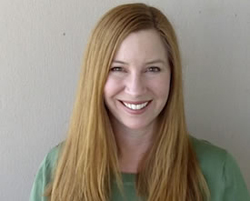Making grammar fun with "Quick and Dirty Tips" from our favorite online expert

Recently, Scribendi.com, the leading online editing and proofreading company, was fortunate enough to interview online go-to grammar expert Mignon Fogarty, also known as Grammar Girl, to ask her some questions about her most popular tips and her status as the web's grammar authority. We're excited to share Mignon's grammar advice and encourage you to follow her "quick and dirty tips."
Grammar Girl Interview
1. How do you keep up to date with your grammar knowledge?
I follow all the major style guides on Twitter, so I see it when they make announcements about changes to their style. I also follow a lot of lexicographers, linguists, and usage writers, so I tend to see their comments when anything major happens that relates to the English language.
People's questions also alert me to trends. Often people will think something is new when it's not, but occasionally, something new does take hold. I learned about kids saying "versing" instead of "playing" from listener and reader questions. (Children will sometimes say, "We're versing Billy's team today," instead of "We're playing Billy's team today.") I learned that some people are starting to put spaces before periods the same way.
2. How do you come up with your most popular tips?
Many of my most popular tips tie a grammar lesson to a pop culture icon or event. People loved it when Donald Trump incorrectly corrected Cyndi Lauper on Celebrity Apprentice and I wrote an article calling him on it. (Lauper said she "felt bad," and Trump sternly told her she should have said "felt badly." He was wrong.)
More recently, Victoria's Secret misused an apostrophe in an ad, and I used it as a lead-in to an apostrophe lesson. People seemed to especially enjoy that article too.
3. If you could give one piece of grammar advice, what would it be?
Know the difference between a style guide and a dictionary. Although people often turn to dictionaries for advice, style guides are actually the books that give the kind of advice most people need. Some of my favorite style guides are Garner's Modern American Usage, The Chicago Manual of Style, and the AP Stylebook.
4. Do you find that a lot of English as a Second Language (ESL) speakers use your site?
Yes, many ESL speakers use my site and post questions to the Grammar Girl Facebook page. Their questions tend to be different from the type of questions asked by people who grew up speaking English. ESL speakers ask a lot of questions about prepositions, and I recently did an article on prepositions that was inspired by those questions.
5. What advice do you have for anyone looking to enter the publishing/editing industry?
Meet your deadlines.
6. What is the most rewarding part of your job as Grammar Girl?
The most rewarding thing about being Grammar Girl is hearing that I've helped people. A close second is finding new ways to make it fun for people to learn.
7. What are your plans for the future?
I just released my first grammar game: Grammar Pop. Right now, it's just for the iPad, but I plan to make it for the Android and iPhone soon. Since the feedback on Grammar Pop has been overwhelmingly positive, I also hope to make more games based on matching words with their parts of speech.
8. Do you think people see grammar as more or less important these days?
Actually, both. In contexts such as text messaging, Facebook posts, and tweets, many people see grammar, usage, and punctuation as less important. In informal situations, more people take an "anything goes so long as you can understand me" approach. On the other hand, all that informality also annoys people and elevates good writing as a skill that teachers and employers seek and value.
9. What are some of your go-to reference books/websites?
I use the following daily:
- The Chicago Manual of Style
- AP Stylebook
- Dictionary.com
- M-W.com
- The Oxford English Dictionary
- Google's Ngram Search
I also consult Garner's Modern American Usage about once a week, and I have 20 or 30 other style guides that I consult on occasion.
10. How did you become a go-to reference yourself?
I'm only guessing, but I believe people appreciate that my articles and podcasts are researched and fairly presented. They aren't just my opinions or what I learned in school. On occasion, I've even had to note that my own pet peeves have no real basis.
I also always try to make learning fun. I throw in the history of a rule when it's interesting and try to come up with funny example sentences or memory tricks. Publishing Grammar Girl books made it easier for people to use me as a reference, and now I'm getting into games. I'm always trying to find new ways to make things fun and to be where people enjoy spending time. When people started enjoying podcasts, I started a podcast. Now people are spending more time playing games, so I'm making games too.
Some final thoughts
There you have it: our exciting interview with Grammar Girl! To learn more about grammar, please check out Scribendi's free resource section, which is full of grammar and writing advice.
Image source: NikolayFrolochkin/Pixabay.com





